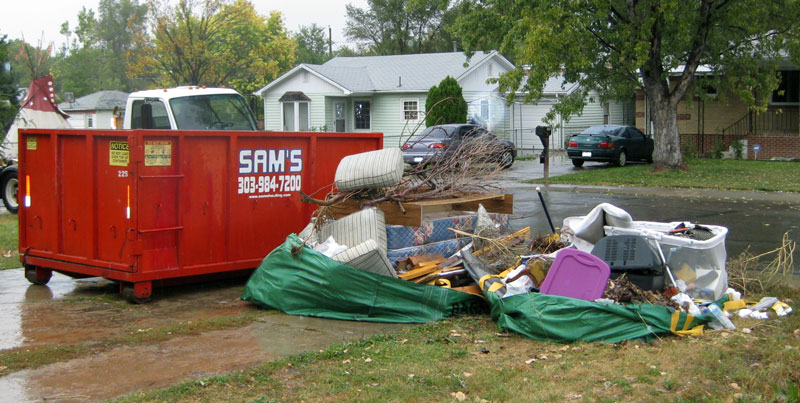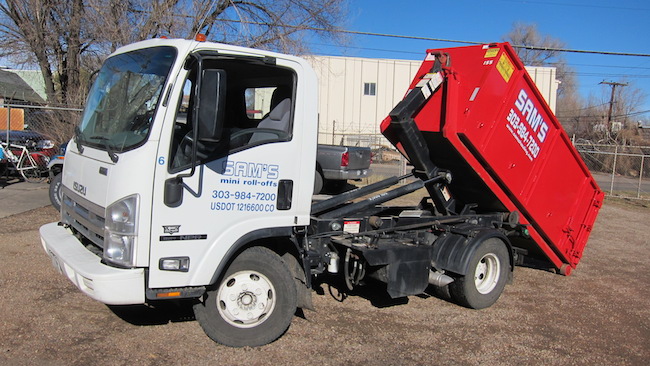Cut the confusion and save time. Master the art of choosing the right dumpster size for projects big and small in Denver and get your waste handled like a pro.
Dumpsters Made Simple: Why Size Matters
Picture this: You rented a dumpster for your basement cleanout. Day three of the project, you’re staring at a half-empty container while mountains of debris still cover your floor. Now you’re paying for two rentals instead of one. Or worse, you went too small and stuffed it so full the company can’t legally haul it away.
These scenarios happen every single day across Denver. Homeowners lose money. Contractors lose time. Projects stall because someone guessed wrong about dumpster size instead of choosing strategically.
The problem runs deeper than wasted cash. Wrong-sized dumpsters create safety hazards when overfilled. They block driveways longer than necessary. They frustrate neighbors and delay timelines. Every miscalculation ripples through your entire project, turning straightforward jobs into headaches.
Here’s the relief: choosing the right dumpster isn’t rocket science once you understand the simple framework. You don’t need to become a waste management expert. You just need to match your project type, debris volume, and timeline to the appropriate container. This guide walks you through exactly that process so you nail it on the first try.
The First Step to Dumpster Success
Before you can select the right container, you need to honestly assess what you’re tackling. A kitchen remodel generates different waste than a roof replacement. A garage cleanout differs completely from a landscaping overhaul.
Home renovation projects typically produce mixed debris. Drywall, old cabinets, flooring, fixtures, and packaging materials all pile up fast. You’re dealing with bulky items that take up space but might not weigh much. A bathroom gut weighs less than you’d think but fills a container quickly because of all those awkward shapes.
Roofing projects create heavy, compact waste. Shingles stack efficiently but add weight rapidly. A typical residential roof tear-off generates 2-4 tons of material. That weight matters because dumpsters have load limits regardless of how full they look. Overfill on weight and you’ll face overage charges that sting.
Landscaping work produces volume without much weight. Tree branches, shrubs, soil, and sod are bulky but relatively light. You’ll fill a container to the brim before hitting weight limits. These projects often need larger containers than homeowners expect because yard waste doesn’t compress well.
Whole-house cleanouts sit somewhere in the middle. You’re hauling furniture, appliances, boxes of belongings, and decades of accumulated stuff. Some items are dense and heavy like old furniture. Others are light but space-hogging like mattresses and cushions. These projects demand careful estimation because the mix varies so dramatically.
How to choose your dumpster size starts with brutal honesty about your project scope. Measure the area you’re clearing. Count the rooms you’re renovating. Estimate the square footage you’re re-roofing. Concrete numbers beat vague guesses every time.
What Does Each Size Really Mean?
Roll off dumpster sizes get measured in cubic yards, which means absolutely nothing to most people. Telling someone a 12-yard dumpster holds 12 cubic yards of material doesn’t help them visualize capacity. Let’s translate that into real-world terms you can actually picture.
A 6-yard dumpster measures roughly 10 feet long, 6 feet wide, and 4 feet tall. Think of a large pickup truck bed parked in your driveway. This size handles small bathroom remodels, garage cleanouts, or minor deck removals. You can fit about 2-3 pickup truck loads of debris. Perfect for weekend warriors tackling focused projects that won’t generate massive waste volumes.
A 9-yard container stretches to about 12 feet long, 6 feet wide, and 4.5 feet tall. Imagine an extended pickup truck bed with high sides. This size works for medium bathroom renovations, small kitchen remodels, or basement cleanouts. Capacity hits around 3-4 pickup truck loads. Homeowners doing serious decluttering or small-scale renovations find this sweet spot between cost and capacity.
A 12-yard dumpster runs approximately 14 feet long, 7 feet wide, and 4.5 feet tall. Picture a cargo van’s interior space. This popular size tackles large cleanouts, kitchen renovations, or flooring removal for whole floors. You’re looking at 4-6 pickup truck loads worth of space. Most residential projects land here because it provides generous capacity without overwhelming typical driveways.
A 16-yard container measures about 16 feet long, 7.5 feet wide, and 5 feet tall. Think of a moving truck bed. This size handles major home additions, whole-home cleanouts, or significant commercial projects. Capacity reaches 6-8 pickup truck loads. Contractors love these for multi-room renovations or when timelines don’t allow multiple hauls.
Factors That Impact Your Dumpster Size Decision
- Choosing the right dumpster size in Denver involves more than just matching container dimensions to project type—several key factors affect what size will actually work for you.
- Debris type greatly influences selection. Heavy materials like concrete, brick, or dirt reach weight limits quickly. A 6-yard dumpster can legally hold 3–4 tons of concrete, while a 16-yard option would hit the limit only one-third full, wasting money.
- Property accessibility can restrict your options. Large dumpsters require adequate driveway space and turning radius for delivery trucks. Always measure available space and check for obstacles like trees, power lines, or garage overhangs.
- Denver waste regulations affect what can go in your dumpster. The city enforces strict rules on construction and hazardous materials. Some items need special handling, impacting both pricing and container selection.
- Rental duration subtly impacts the best size choice. Short-term projects may need slightly larger dumpsters to handle debris quickly. Longer rentals allow more efficient packing but can increase costs if heavy materials accumulate over time.
Avoid These Rookie Mistakes When Renting a Dumpster
- Many homeowners underestimate their waste volume. A 12-yard dumpster looks huge until you start filling it with furniture, debris, and demo materials; then it fills up fast.
- Going too large wastes money. A small dumpster costs much less than a 16-yarder, so if your project only needs 6 yards, paying for 16 drains your budget unnecessarily.
- Ignoring weight limits can get expensive. Dumpster rentals include a tonnage allowance; exceeding it means paying overage fees per ton. Different materials vary widely in weight per cubic yard, so know what you’re hauling.
- Access space matters. Delivery trucks need room to position dumpsters. Gates, fences, cars, and landscaping can block placement. Always clear space before delivery.
- Don’t mix prohibited items. Mattresses, tires, electronics, paint, and hazardous materials require special disposal in Denver. Adding them to standard dumpsters can lead to rejection, fines, or violations.
How Sam’s Hauling Makes Dumpster Sizing Effortless
Picking the perfect dumpster size shouldn’t feel like advanced mathematics. That’s why Sam’s Hauling built their service around removing the guesswork from your rental experience.
Their sizing consultation happens over a simple phone call or online form. You describe your project in plain language. No need to calculate cubic yards or estimate tonnage. The Sam’s Hauling team asks targeted questions about your project scope, waste type, and timeline. Within minutes, they recommend the optimal container size based on hundreds of similar Denver projects they’ve handled.
Transparent pricing eliminates hidden surprises. You’ll know your rental cost, included weight allowance, and any potential overage fees upfront. No fine print. No sudden charges when the truck arrives. This clarity helps you budget accurately and make informed decisions about whether to upsize or downsize your container.
Flexible rental periods adapt to real-world project timelines. Home renovations rarely stick to schedule. Weather delays happen. Permit issues arise. Family emergencies interrupt progress. Sam’s Hauling doesn’t penalize you with rigid rental windows. Need an extra few days? No problem. Ready for pickup earlier than expected? They’ll adjust accordingly.
Denver metro delivery coverage means you get reliable service whether you’re in the city center or surrounding suburbs. The team knows Denver neighborhoods, traffic patterns, and local disposal regulations. They navigate the logistics so you can focus on your actual project instead of coordinating waste removal.
Expert guidance prevents costly mistakes before they happen. The Sam’s Hauling staff has seen thousands of projects across every category. They know which sizes actually work for specific jobs. They’ll warn you if your estimate seems off. They’ll suggest alternatives if your situation demands creative solutions. This experience protects your budget and timeline from rookie errors.
Ready to Stop Guessing? Get the Right Dumpster Today!
Stop gambling with your project budget and timeline. Every day you delay ordering the right dumpster is another day your renovation stalls or your debris piles higher.
Sam’s Hauling makes it simple. Call their Denver team at (303) 984-7200 or book online in under five minutes.
Describe your project in plain terms. Get an expert recommendation on the perfect dumpster size for your specific needs. Lock in transparent pricing with no hidden fees. Schedule delivery when you’re ready to start.


